Turkey is a brilliant for shopping. The assortment of local bazaars makes you dizzy and can potentially send you on a shopping spree.
You can buy everything here – from bright ceramics to skillfully made silk carpets.
Given the love of the bargaining among locals, shopping turns into a real competition, the pursuit of trophies…if you will.
To avoid a last minute mad rush to look for souvenirs from Turkey, we recommend that you read our comprehensive list of all the things that you can buy as gifts from here.
Istanbul remains our preferred place to purchase all gifts from Turkey.
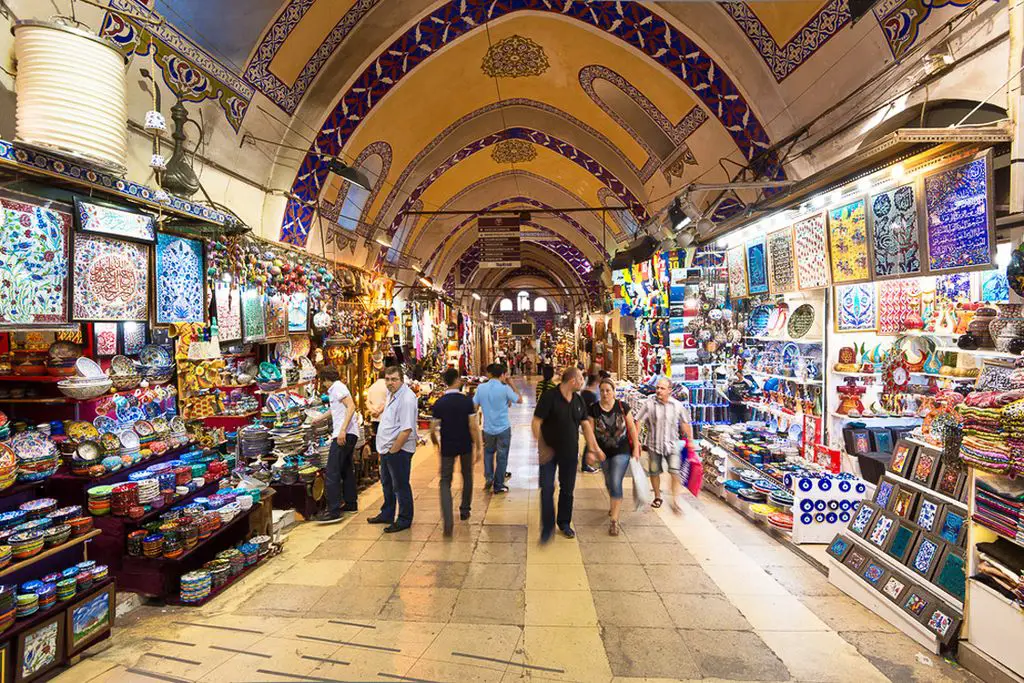
Table of Contents
- 1. Sweets, Spices and other Foods
- 2. Tea, Coffee and Utensils for them
- 3. Hookahs and Smoking Accessories
- 4. Cosmetics
- 5. Other Traditional Turkish Souvenirs
- What cannot be exported from Turkey
1. Sweets, Spices and other Foods
1.1 Baklava, Pismaniye, Turkish delight, Sherbet and other Sweets
The choice of Turkish desserts is huge. They can be found in bazaars, pastry shops (for example, Akdeniz Dondurma in the Kaleici district of Antalya) and specialty shops (Yenigün or Sorbet).
Before you buy, be sure to try … and just take a bottle of water with you.
Buying, as you may understand, is better by weight. Such sweets are fresher and in terms of kilograms will come out cheaper!
The only exception can be Pismaniye, which is best taken packaged and sealed as well as possible, as it easily absorbs moisture and loses its fluffiness.
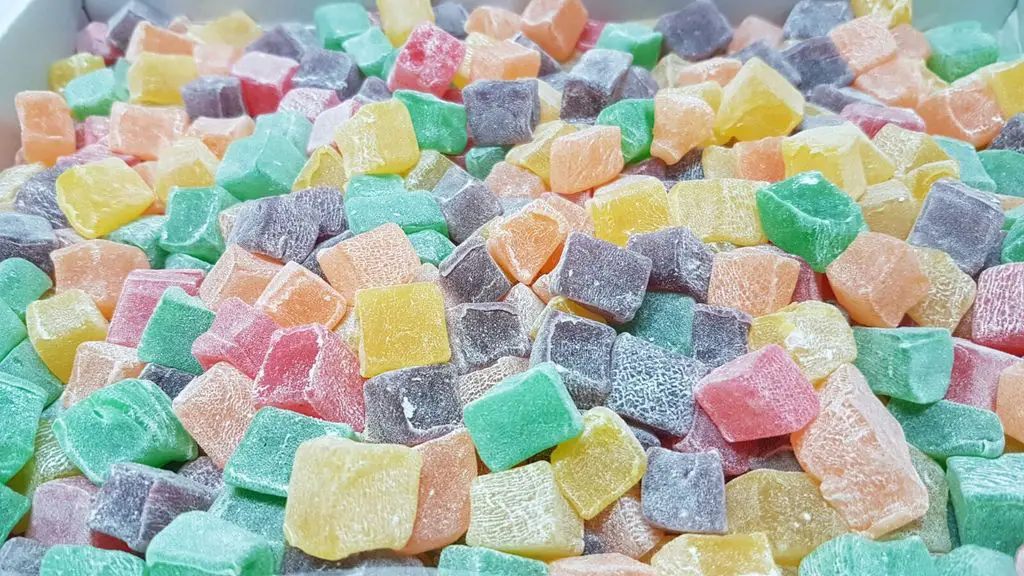
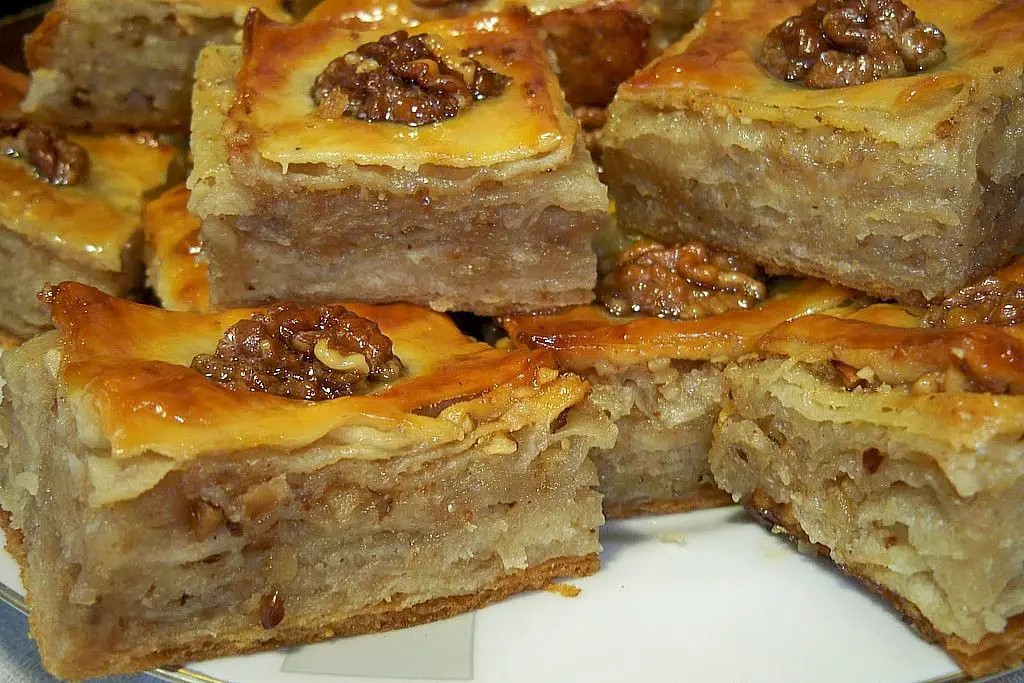
1.2 Rose jam and sweet paste “Mesir macunu”
There are many unusual jams made in Turkey. Not only from rose petals, but also from walnuts, bergamot, watermelons, eggplant, tomato, etc.
You can buy it in any supermarket. The most famous Turkish brands that make various jams are Koska and Yenigün (this is an Anatolian brand, so look for such stores in Antalya).
The medicinal paste Mesir macunu does not look like jam, but like liquid honey, although it is also found in solid form as sweets or Turkish delight.
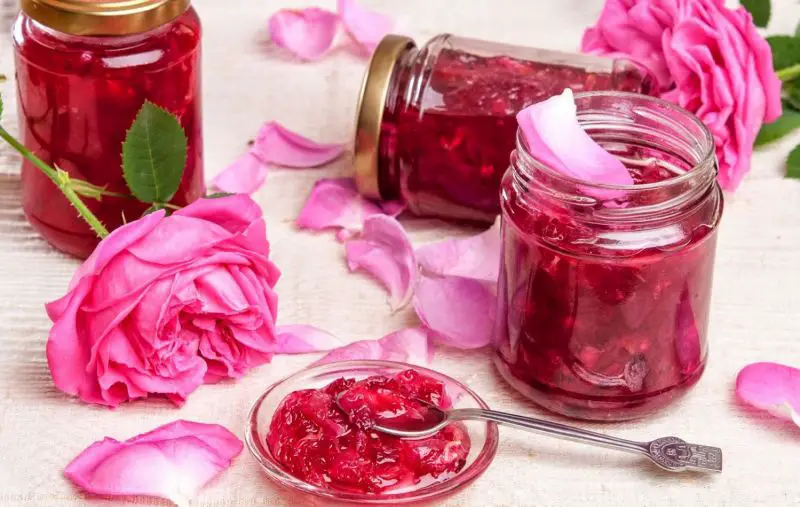
This sweet souvenir from Turkey is on the UNESCO Intangible Heritage List.
It contains 41 natural ingredients, including ginger, turmeric, royal jelly, cloves, pepper, coriander, anise, saffron, cinnamon, cardamom, lemon peel, etc.
Mesir macunu was first made in the city of Manisa as a medicine for the mother of Sultan Suleiman the Magnificent.
It continues to be eaten to increase immunity and cope with respiratory diseases.
1.3 Spices
Spices can be bought anywhere in Turkey – in supermarkets, markets and specialty stores.
The ideal place to buy is the Egyptian market in Istanbul, which is also informally called the spice market.
But if you are relaxing in the resorts on the Mediterranean Sea, look for special spice shops Aktar and Baharatci.
Avoid buying spices from souvenir shops and touristy places as there is a chance that you will buy a low quality stuff at an inflated price.
We also do not recommend buying readymade spice mixtures, because their components are so crushed that it is ruins the quality of the spices and their shelf life.
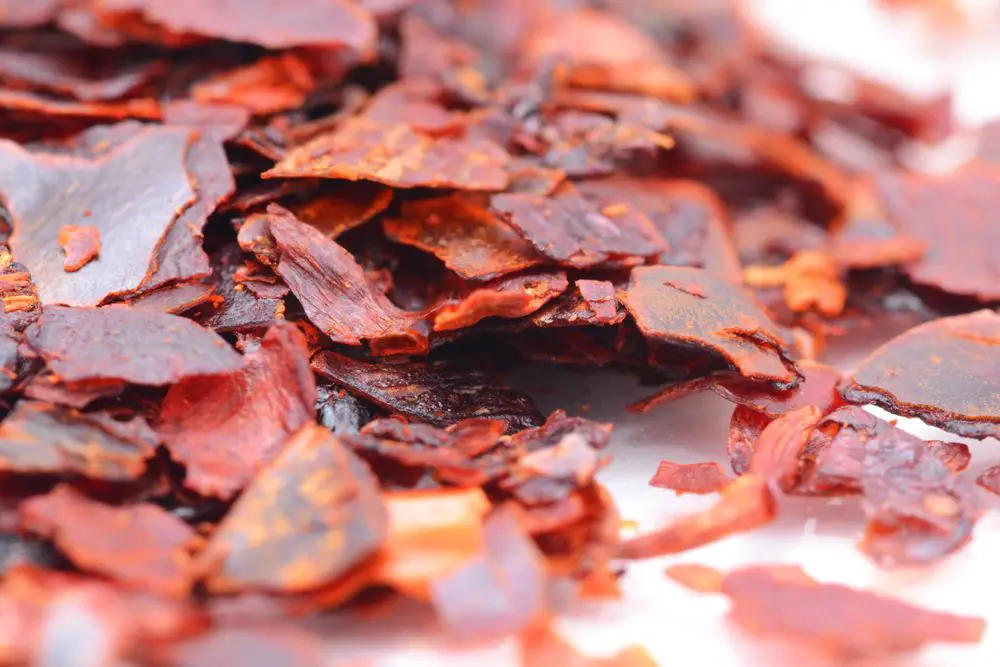
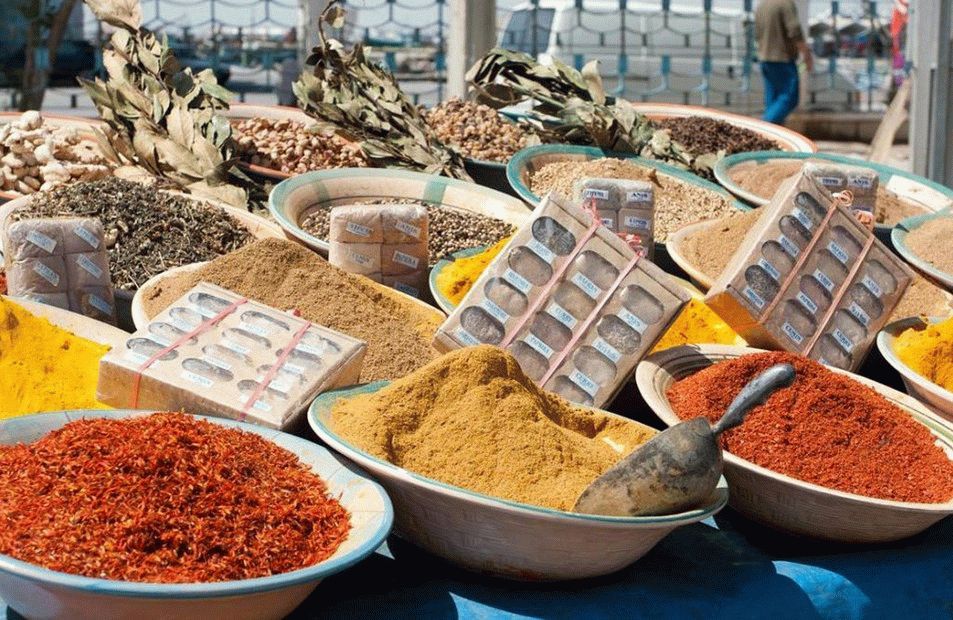
What spices to bring from Turkey
- Red pepper flakes – The spice is spicy, the degree of spiciness can be determined by color – the darker, the spicier. Red pepper flakes are added to almost all dishes in Turkey, they are one of the main ingredients for lentil soup.
- Isot – This is a variety of red pepper, but darker, almost black in color. Its color is achieved by drying for extended time in the sun. Isot is much hotter than regular red pepper and is used for cooking hot meat dishes.
- Sumac – These are dried berries with a sour taste. It is added to salads and vegetable dishes.
- Black cumin – Aromatic spice is added to pastries, pilaf and many other dishes.
1.4 Pomegranate Sauce
Sour pomegranate sauce is highly concentrated natural pomegranate juice without preservatives and other additives.
The only thing that is added there is some spices in a small amount. This sauce goes well with meat and fish, salads and desserts, and even ice cream.
It is sold in supermarkets or in the market. It is better to take the one that says “Nar Ekşisi” or “Ev yapımı Nar Ekşisi” (homemade pomegranate sauce) if you buy it in the market.
But if “Nar Ekşili sos” is written on the bottle, it means that sugar is added there – this makes the sauce sweet, but not 100% additive free.
1.5 Raki
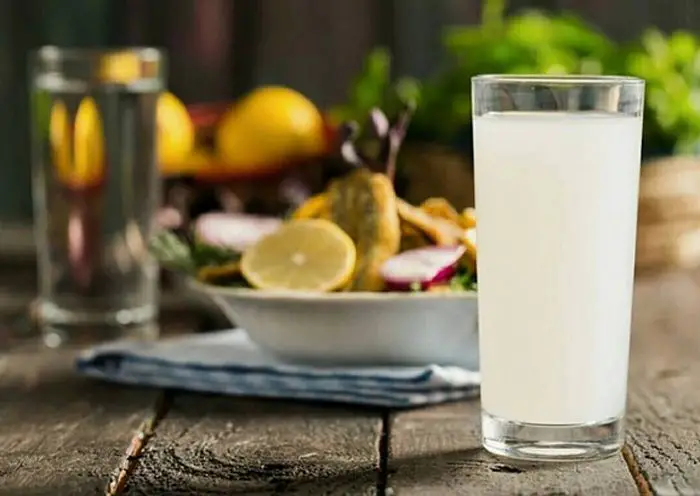
Raki is Turkish anise liquor with 40-45% alcohol. Because of because of the anise in it, the liquor resembles a cough mixture for many.
Usually one drinks Raki diluted with water with ice, juice, or makes cocktails with it.
One of the most popular brands is YeniRaki, which has good quality and quite an affordable price.
Another quality brand is TekirDag, which could very well be a flashy souvenir from Turkey.
Alinbas belongs to the elite varieties of aniseed liquor. Its price is much higher.
1.6 Cheese
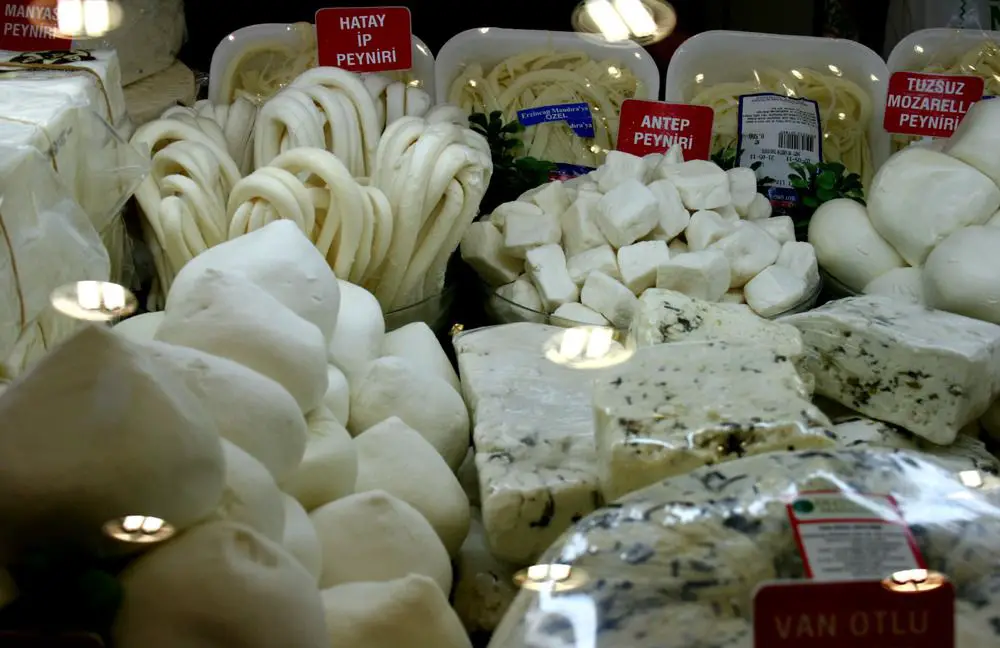
Turkish cheese is an inexpensive and a great option to bring home something tasty. When buying cheese in the market, you can try all possible options as is the way in Turkey.
There are many types of Turkish cheeses such as:
- Tulum – comes in three variations – crumbly, hard and soft. The best reviews of Tulum cheese go to the one made in the Aegean coast near Izmir. Price is from 50-60 liras per 0.3 kg.
- Goat cheese (Keçi peyniri) and sheep cheese (Koyun peyniri) – cheap versions of these cheeses will contain cow’s milk. The more expensive cheeses contain only the goat’s or sheep’s milk. Approximate cost is from 34.5 lire for a package of 300 g of goat cheese, from 52 lire for a package of 400 g of sheep cheese.
- White cheese (Beyaz Peyniri) – is similar to feta cheese. It is sold with brine in packages. Most often bought brands are İçim, Doğruluk, Tahsildaroğlu and Pınar. Price per 450-500g package from 60 lire.
- Suzme Peynir (Süzme peyniri) – another cheese similar to feta cheese. Also packaged in brine. The price is about 16 lire for a pack of 250g.
- Eski Kashar (Eski kaşar peyniri) – hard and salty cheese, considered an analogue of parmesan. Some eat cheese dipped in jam. The price is from 30-40 lira for a package of 350g. A less salty version of this cheese is Taze kaşar peyniri.
- Braided ögrü cheese (Örgü peyniri) – Örgü cheese has a salty milky taste. The cheese is fibrous, so it can be easily split like a chechil string cheese. The cost is from 31-36.5 liras for a package of 200g.
- Whey cheese (Lor Peyniri) – inexpensive and dietary cheese (100-150 kcal/100g). Most often this cheese is used in baking. Not to be confused with Lor milk curd (calorie content more than 200 kcal). A kilogram of this cheese can be bought for about 50 lira.
Some tourists also purchase yogurt and kefir cultures in Turkey. The cost of a package is from 1 lira.
1.7 Honey
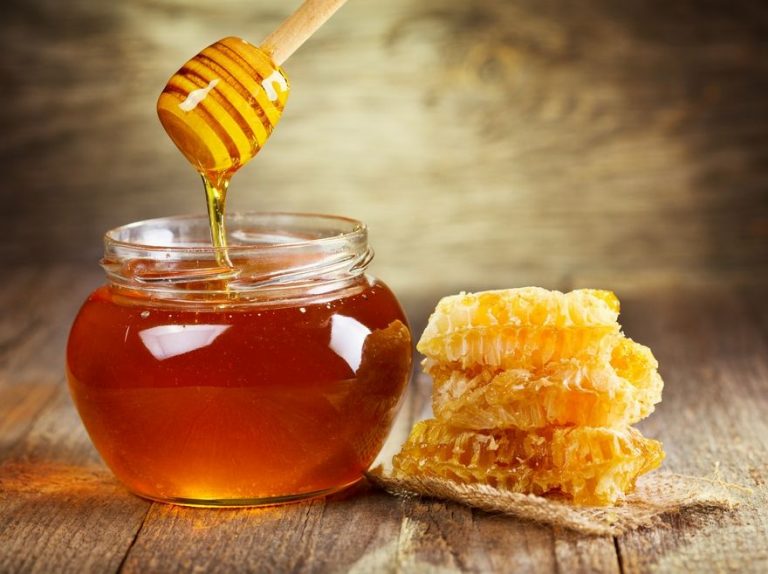
Turkey is one of the largest honey producers in the world.
In the shops you can find floral, cotton, citrus and other honey. But pine honey is especially valued here, 92% of which is made in the Aegean Sea.
Such a unique product is a worthy souvenir from Turkey, so do not forget to bring it back home. The price for a jar of high quality honey starts at $10.
Often in stores you can find honey with the addition of assorted nuts. This is not exactly the same as pure Turkish honey, but a rather tasty sweet, which is incredibly popular among tourists. Its price is $4-5 for a can of 200 g.
1.8 Turkish Pistachios
Turkey is one of the world’s leading exporters of pistachios.
Local pistachios are different from the ones you get outside Turkey. They are larger, not so salty, with a rather sweetish taste.
Pistachios in Turkey are not cheap, but the prices are still lower than abroad and the quality is much better. In the market 1 kg of pistachios costs from 60 to 90 lira.
Small sealed bags can be purchased at supermarkets.
2. Tea, Coffee and Utensils for them
2.3 Turkish tea and tea utensils
Until the 19th century, tea was not grown in the country. Then the plantations were planted with seeds from eastern Georgia.
Now tea is mainly grown in the vicinity of the city of Rize.
The Turks practically do not use pesticides and inorganic fertilizers and the drink turns out to be healthy and environmentally friendly.
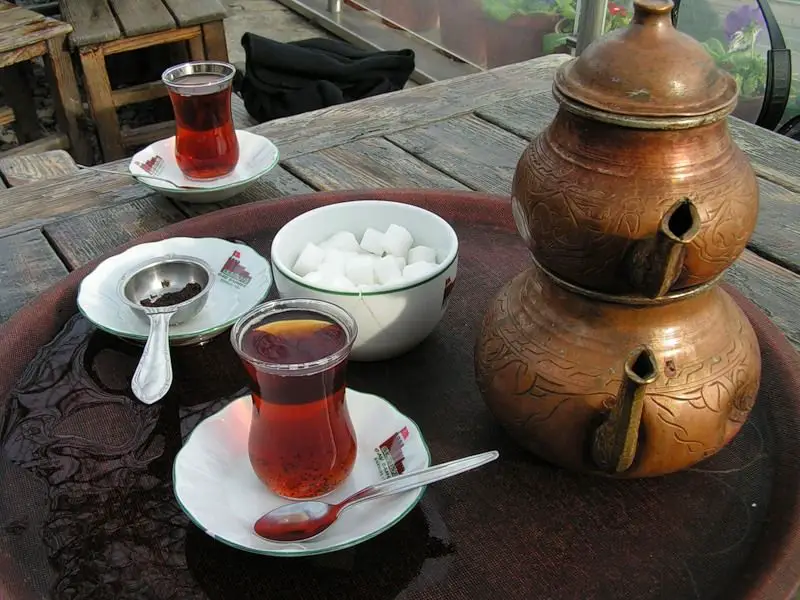
Another feature of tea from Turkey is the almost zero content of caffeine. Turkish tea without additives also does not have a special aroma.
But when cold, it perfectly quenches thirst and cools the body.
Tea in Turkey is often sold in large volumes like half a kilogram, and not 100-200 g, many are used to. And this is easy to understand if you have an idea of Turkey’s tea culture.
The Turks drink a lot of tea. In fact they treat the process of tea drinking almost as scrupulously as in Japan or China.
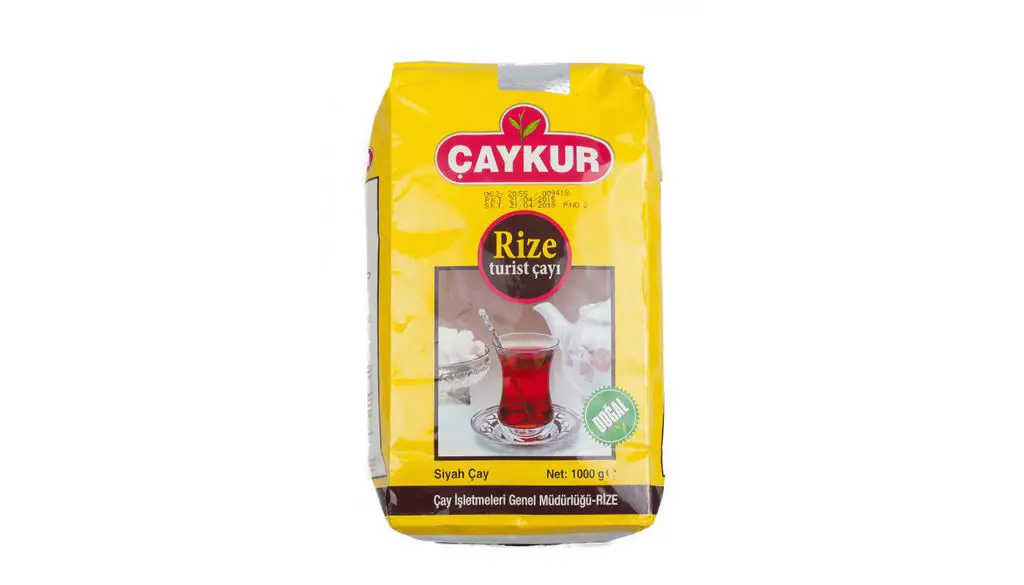
Conventionally, all tea can be divided into 3 types: black leaf, herbal and powdered tea.
The most popular black tea brands are Çaykur and Doğadan.
This tea is not the same black tea brew as you might know, and not everyone likes it. So before buying a large pack as a souvenir from Turkey, try it.
Herbal teas (for example, ada-chai or sage tea) are better to look for in the markets such as the Egyptian market in Istanbul. And remember to buy by weight so as not to splurge unnecessarily.
And it’s better stay away from powdered teas like apple, pomegranate and others that the Turks treat tourists to. These are chemical mixtures based on sugar, citric acid and food essences.
Turks drink tea from special armud cups, shaped like a pear. You can buy the special Turkish teapot-samovar (“chaydanlyk”) and tea cups (“chaybards”) with saucers and small spoons as souvenirs.
2.4 Turkish coffee and coffee utensils
Turkish coffee is characterized by fine grinding, rich taste and light creamy foam.
It is made using a powdery grind. Most often, cinnamon, cardamom, cloves or nutmeg are added for taste.
As a rule, Turkish coffee is prepared on the sand. Coffee is served with sugar and a small glass of water.
It is better to buy coffee at grocery markets or large supermarkets, and if possible, buy it in Istanbul.
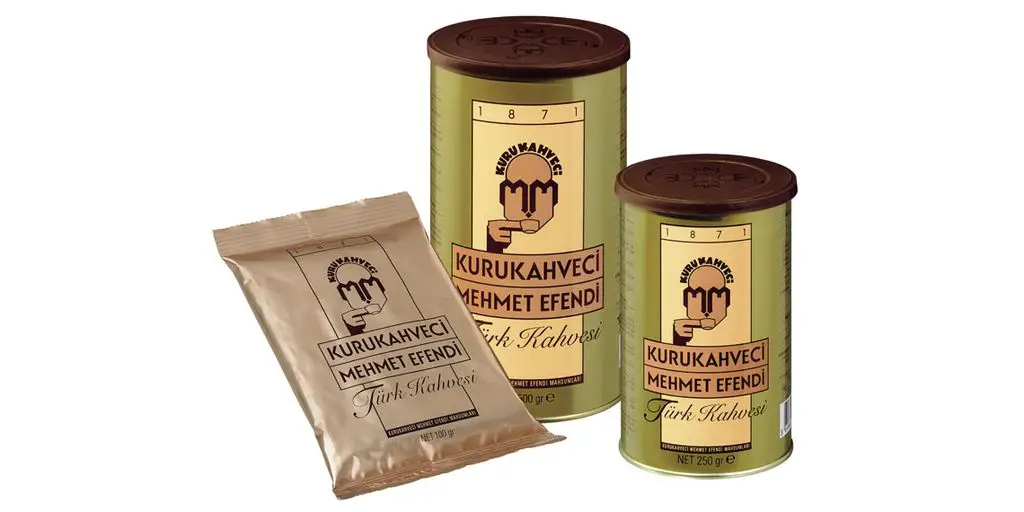
There, in the famous store Kurukahveci Mehmet Efendi located on Tahmis Street behind the Egyptian Bazaar, you can buy freshly roasted coffee or vacuum-packed finely ground coffee.
It will be a great souvenir from Turkey!
We advise you to take several small packages instead of a large pack, so you better preserve the aroma, and hence the quality of the drink.
Kurukahveci Mehmet Efendi is considered the leading coffee producer in Turkey. In general, these are the top coffee brands to look out for:
- Kurukahveci Mehmet Efendi – The most famous coffee producer in Turkey. Now Kurukahveci Mehmet Efendi products are sold in 50 countries, but in Turkey such coffee is much cheaper. The coffee is quite strong, but the taste is mild. A pack of ground coffee weighing 100 grams will cost 5-6 lire. Coffee beans are also sold. But there is no soluble Mehmet Efendi coffee powder.
- Keyfe Türk Kahvesi – Good Arabica coffee has 3 different types (they differ in the color of the packaging): copper – classic coffee; pink – with the taste of Turkish delight; blue – the taste of mastic. A pack weighing 100 grams will cost 3.5–4 lira.
- Hisar Kahve 1928 – This coffee is a local favorite. It costs a little more than popular brands (from 7 liras per 100 gr). Coffee gourmets are recommended to try “The Palace Series” – coffee of the royal series.
- Kocatepe Dibek – It is worth trying coffee with cardamom. It has a uniquely oriental taste. The price for 100 gr is 4.5–5 lire.
In addition to Turkish coffee, you can bring a the entire coffee set comprising of
- copper or aluminum cezve with a wooden handle
- a coffee spoon with an elongated handle (to stir coffee in a cezve) with an elegant carving
- a measuring spoon
- Turkish-style coffee pair – saucers and cups with a volume of 150 ml
- a copper or silver tray
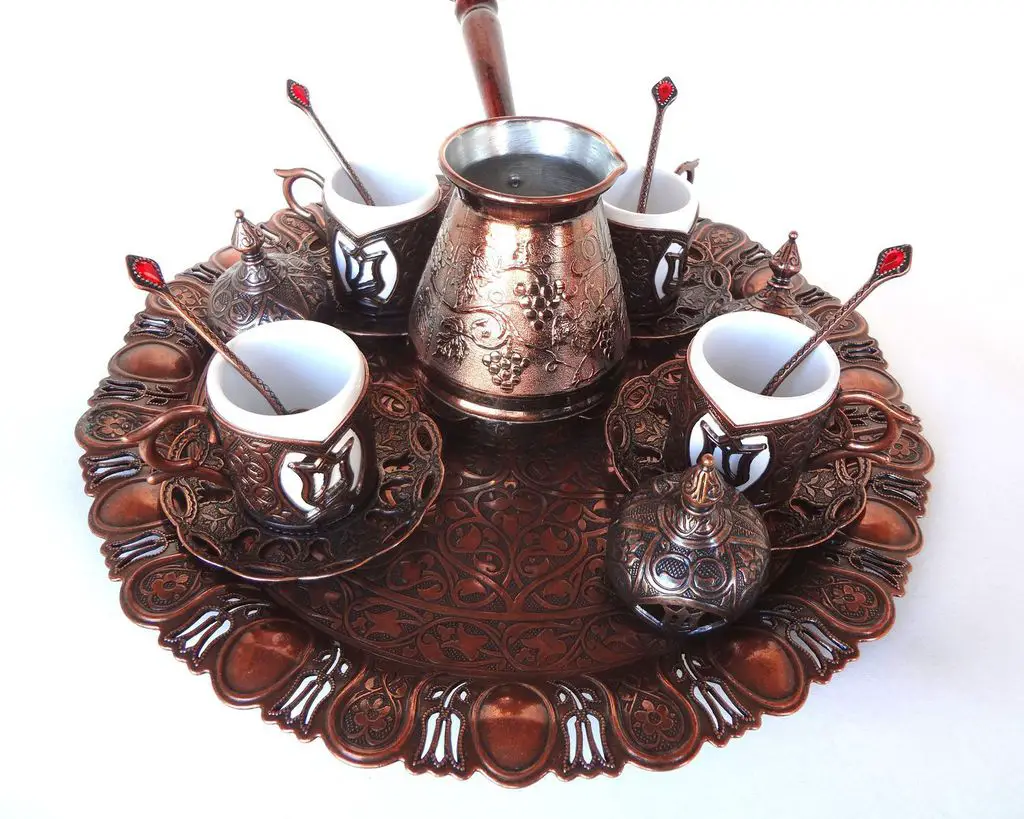
3. Hookahs and Smoking Accessories
3.1 Hookah
Hookahs in Turkey are of two types – ordinary ones that are used for smoking, and souvenir ones that are used as decoration.
In souvenir shops, it is the latter that are most often sold.
Note that a number of airlines categorically prohibit carrying a hookah in the cabin, so take care of transporting it back before you buy it.
Among Turkish hookah tobaccos, we recommend Serbetli and Nakhla.
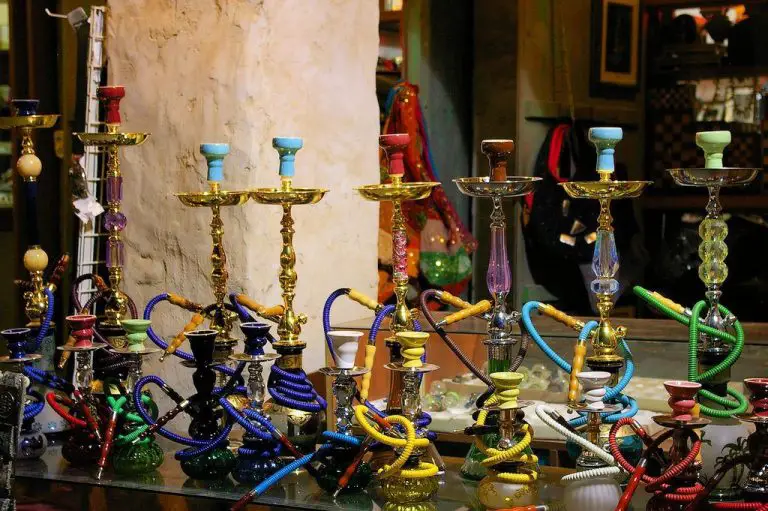
3.2 Meerschaum pipe
Meerschaum pipe is a smoking pipe made from Meerschaum or Sepiolite.
Meerschaum is a lightweight material formed from the remains of prehistoric marine life.
It is mined only in one place – in Turkey, in the vicinity of the village of Eskisehir, located 200 km from Istanbul.
Meerschaum is ideal for making smoking pipes. It does not get very hot, does not burn and perfectly absorbs moisture and resins.
Decorated with carvings, such a pipe can cost north of $75! But if you still decide to buy such a souvenir, ensure that the pipe has the stamp “Block Meerschaum” or “Solid meerschaum” on it.
This means that it is made from a single piece of sea foam, and not from a pressed one, which means that you don’t have fake, but a high-quality product.
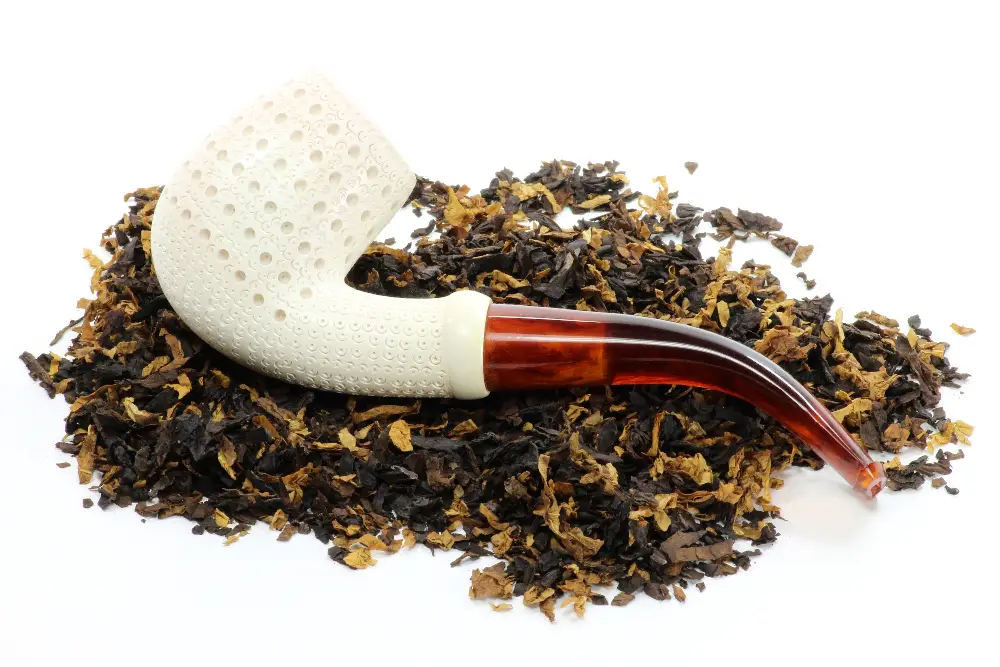
4. Cosmetics
4.1 Soap
Turkey’s centuries old Hammam traditional of a foamy baths has ensured a continuous production of hand-made soaps based on oils and various extracts.
Original aromas such as Turkish coffee, rose petals, rice and black cumin are commonly found here.
Soaps from the brand Thalia are packaged in beautiful boxes – a great option that you can bring from Turkey as a souvenir.
You can complement this gift with a Turkish washcloth – the köse.
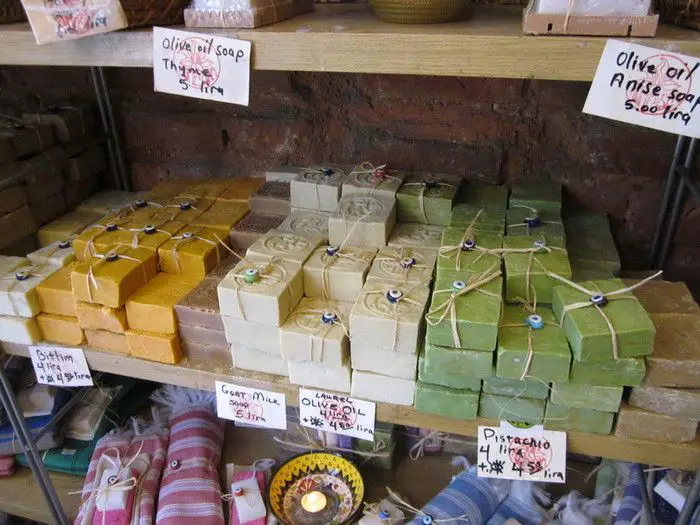
4.2 Mud clay from Harem’s brand
Clay mined in the vicinity of Antalya works wonders for your skin, keeping it a fresh and healthy.
Based on this clay Harem’s produces a wide range of products like masks for hair, face and body, creams and scrubs.
The cost of a small package of clay is from 30 lire. Clay-based products cost more, the price depends on the volume and specific product.
4.3 Olive oil based products
Farmasi and Myros are two famous brands making olive oil based products. Both companies have a wide range of skin care products for the face, hands and décolleté area.
4.4 Rose water
This cosmetic product is deservedly called the elixir of beauty. Rose water refreshes the skin, mattifies excess shine, tightens pores and eliminates dryness.
The best product comes from Isparta, where rose plantations are located.
The most famous Turkish brands are Rosense, Şelale, Otaci, Gülşah, Idil and Efe.
When purchasing rose water pay attention that 100% doğal gül suyu (100% natural rose water) is written on the package.
5. Other Traditional Turkish Souvenirs
5.1 Hamsa
The amulet, which is also called the hand of Fatima, is an open female palm. It is produced in the form of key rings, pendants, various pendants for the home. The minimum cost of such a souvenir is 5–6 lire.
5.2 Eye of Fatima (Nazar Bonjuk)
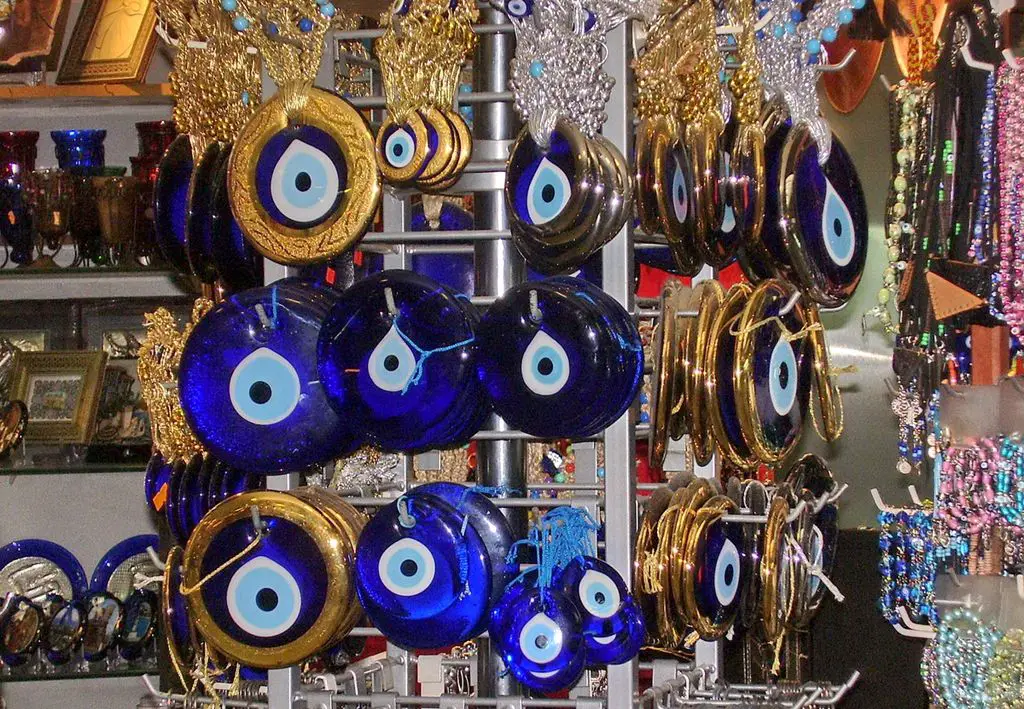
In addition to the Turkish national flag, there is a symbol in Turkey that is indispensable in daily life. Taxi drivers stick it on their rear-view mirrors. Women wear it as a bracelet and decorate the front doors of houses with it.
We are speaking about the Turkish Eye amulet, locally called “Nazar Bonjuk”. This is probably the most recognizable souvenir from Turkey.
It’s kind of a lucky charm that protects its wearer from the “evil eye”.
This piece of jewelry shaped in the form of a small blue eye can be bought in a wide variety of shapes. There are pendants, bracelets, rings and larger versions for the front doors of homes.
5.3 Oriental / Turkish Lamps
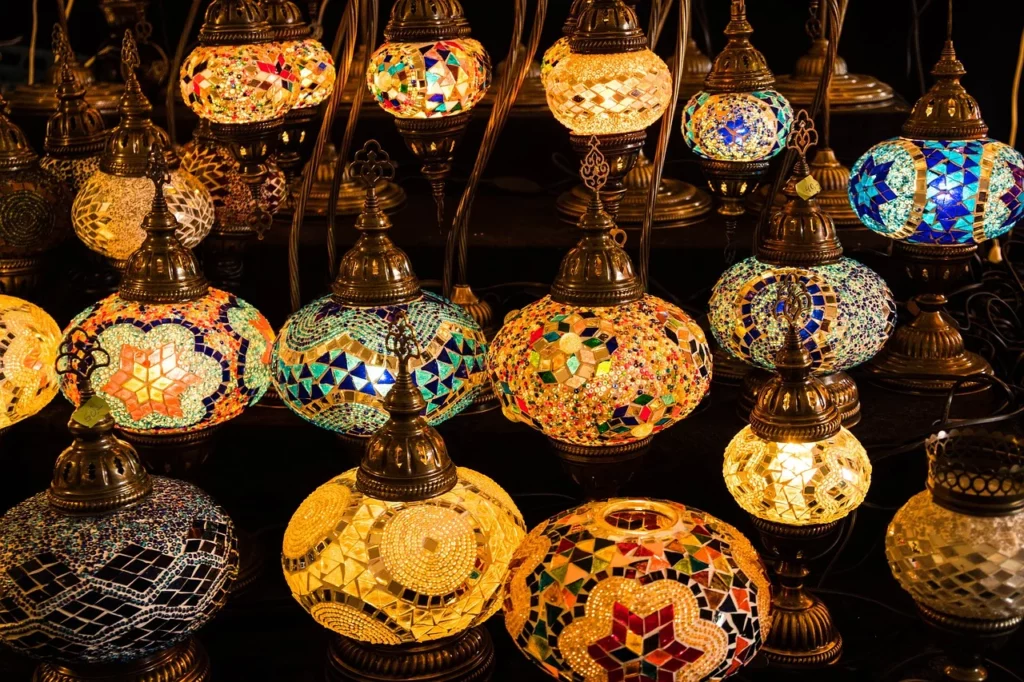
In Turkey, beautiful and colorful mosaic glass lamps are made and sold like in many other Arab countries.
Pay attention to the quality of the lamp when buying. They should be made of brass or copper but some are also silver-plated. Plastic lamps are imported from China or mass produced.
Small flaws in the decoration are not necessarily a sign of a quality defect. If the mosaic stones are set half a millimeter differently here and there, that speaks more for manual work.
5.4 Ceramic plates
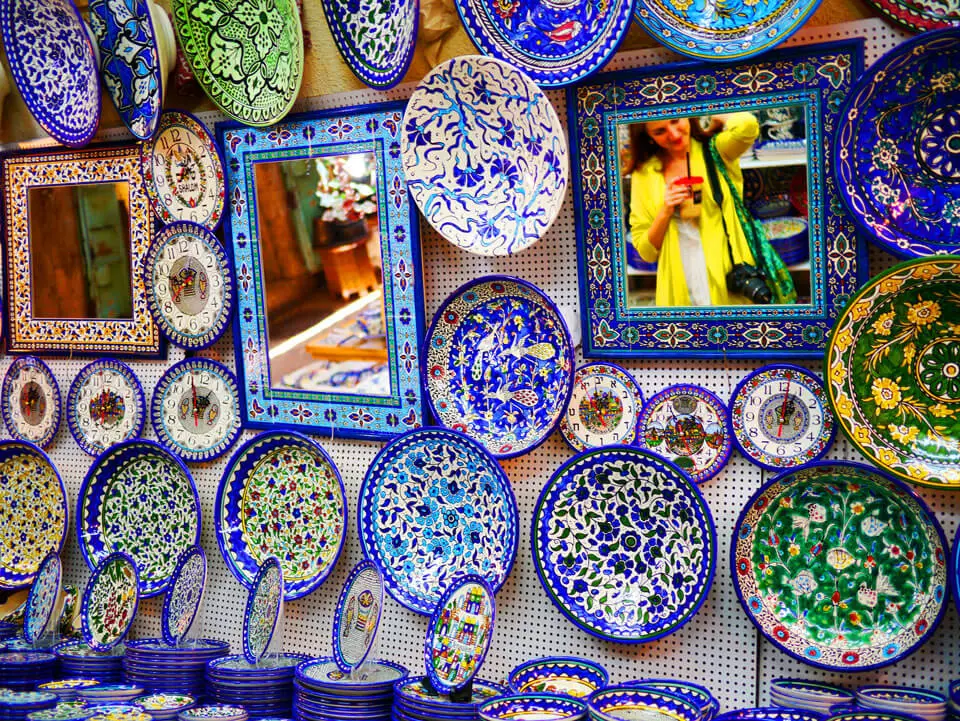
Ceramic handicraft has a long tradition in Turkey. The most famous manufactory is Kütahya that used to supply the court of the Ottoman sultans.
The brightly painted plates are now sold in large quantities in souvenir shops and bazaars. They are basically intended as souvenirs. You can’t put them in your dishwasher.
When buying, you should pay attention to the quality of the plates. There should be no cracks in the ceramics and the glaze.
The patterns should also be as error-free as possible. Small inaccuracies are not a problem.
Machine-made plates all look the same. A brushstroke that is placed here and there by a millimeter indicates manual work.
5.5 Turkish Rugs / Carpets
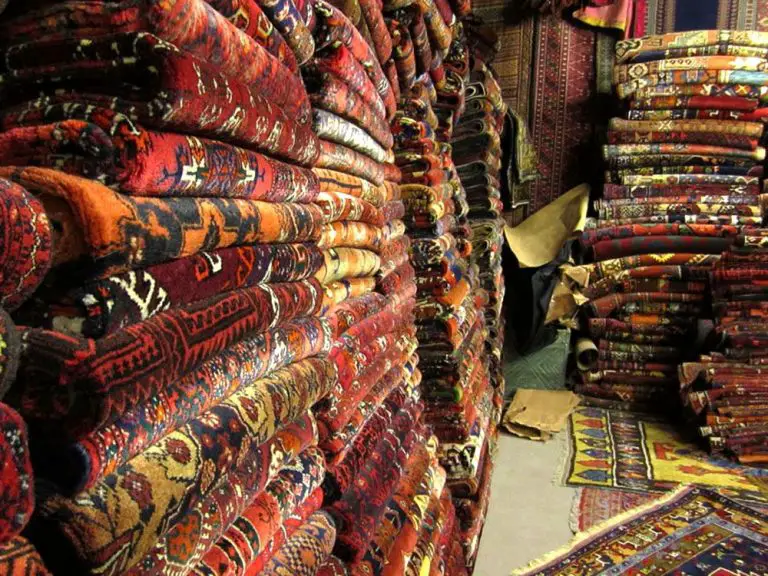
Turkey is one of the few countries where to this day you can buy chic handmade rugs. A carpet with oriental motifs is an original and at the same time a very valuable gift.
Turkish carpets are sold everywhere in the tourist areas. However, you should always be careful with this.
The very first rule for shopping in carpet dealers’ shops (and bazaars) is to bargain. That is what is expected of shoppers. If you are quoted a price of 600 euros for a carpet then you can buy it for 300 to 400 euros.
Rugs in Turkey are made of wool as well as silk.
The cost varies depending on the number of knots per 1 sq. meter. The more the density of knots, the higher the price of the carpet. For example, a 2×3 meter product can cost $80-100, but the price of large models reaches $1,000 or more.
If you want to buy a large oriental rug note that most stores in Turkey provide services for the delivery of their products to anywhere in the world.
What cannot be exported from Turkey
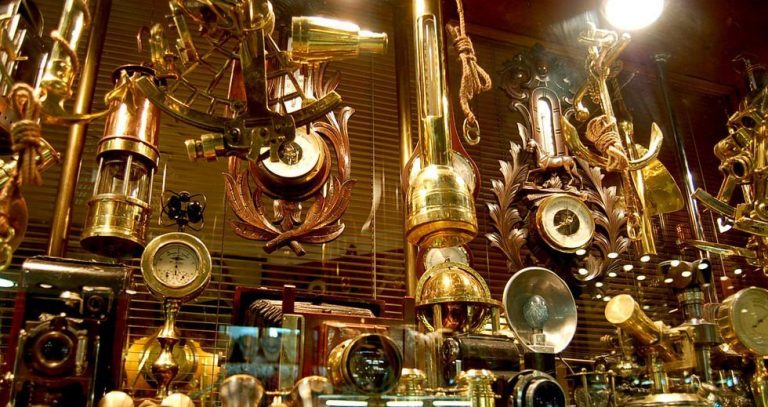
Like other countries, Turkey imposes a number of restrictions on the export of certain items. Among them:
- Carpets over 100 years old
- Antiques – this includes items older than 50 years
- Ancient coins
- Medicines containing narcotic substances
- Corals and shells without a receipt for their purchase
- Exotic animals and plants
- Jewelry worth more than $15,000
- Alcohol more than 5 liters
- Food products worth over $27 and a total weight of more than 5 kg
- Souvenir products worth more than $1000
